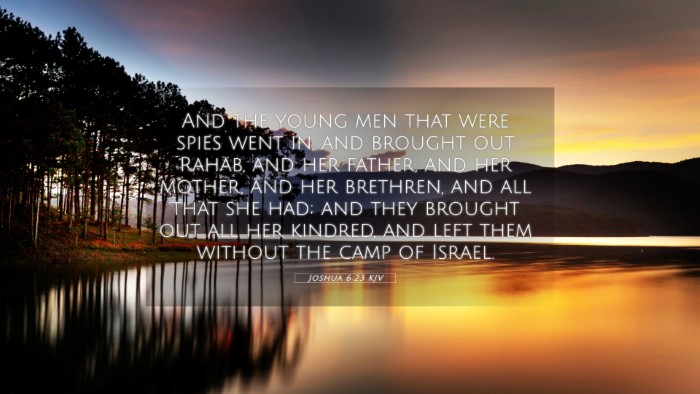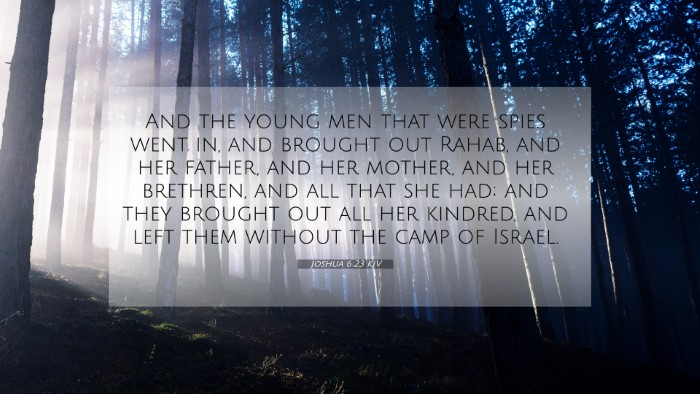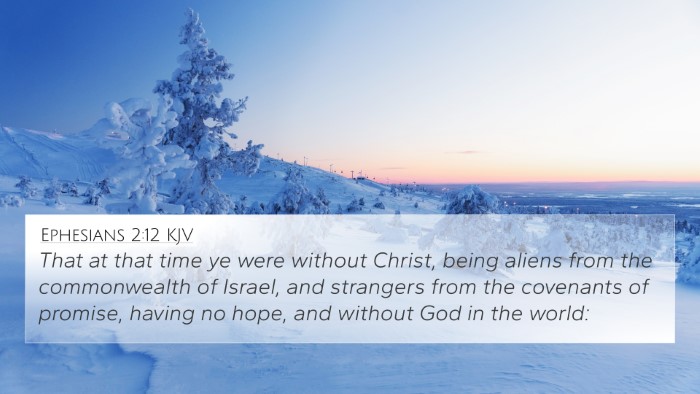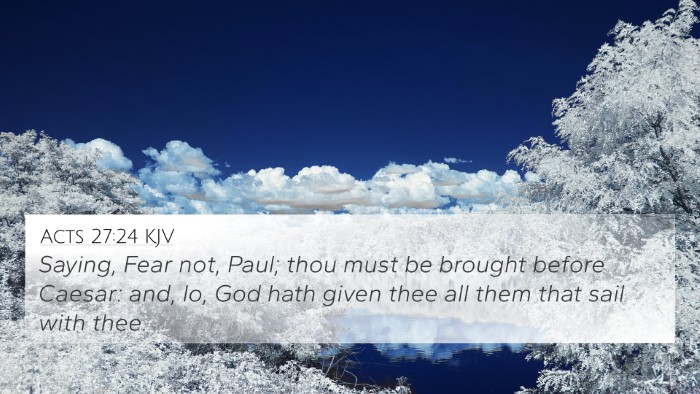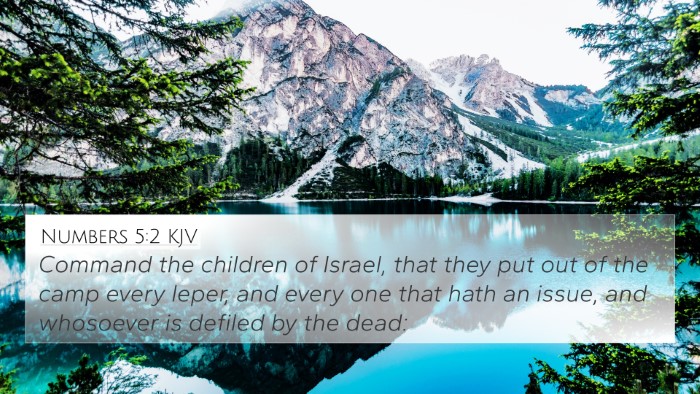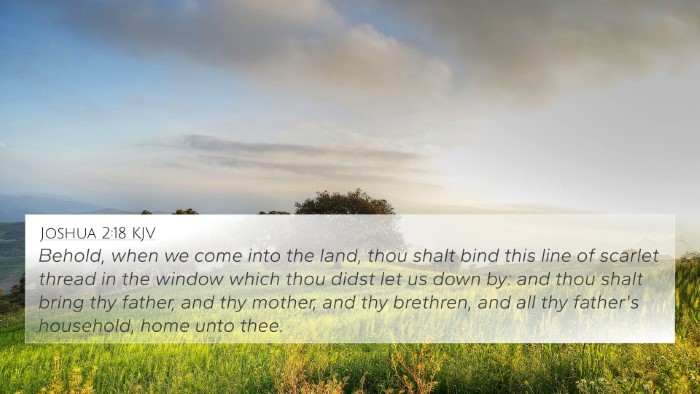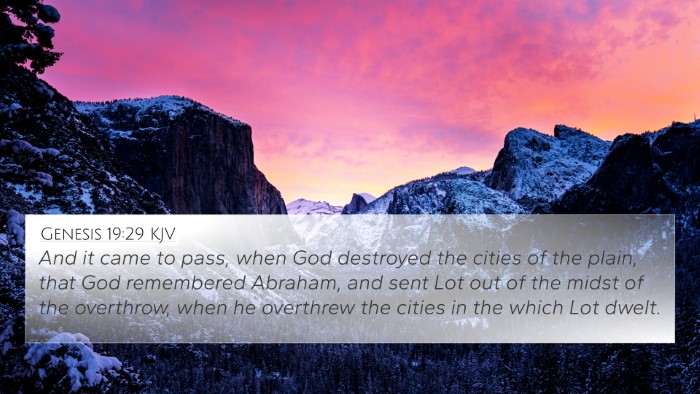Understanding Joshua 6:23
Joshua 6:23 states: "And the young men that were spies went in, and brought out Rahab, and her father, and her mother, and her brethren, and all that she had; and they brought out all her kindred, and left them without the camp of Israel."
Summary of the Verse
This verse recounts a critical moment in the conquest of Jericho, highlighting the safety and deliverance of Rahab and her family. As a harlot who aided the Israelite spies, Rahab’s act of faith in recognizing and protecting them resulted in her being spared from the destruction of Jericho. The narrative emphasizes themes of grace, mercy, and the acknowledgment of faith in God.
Commentary Insights
-
Matthew Henry:
Henry notes that Rahab represents the mercy of God toward those who show faith, irrespective of their past. Her acceptance into Israel demonstrates that God can redeem anyone who believes.
-
Albert Barnes:
Barnes emphasizes the significance of family unity in Rahab’s deliverance, suggesting that when one member of a household has faith, there is a potential for the entire household's salvation.
-
Adam Clarke:
Clarke highlights Rahab's actions in light of her faith. He discusses the importance of obedience to God's will and how through actions, even a Gentile can receive God’s favor.
Bible Verse Cross-References
This verse resonates with several key themes and other scripture passages:
- Hebrews 11:31: "By faith, Rahab the harlot perished not with them that believed not, when she had received the spies with peace." - This connects Rahab’s faith to her deliverance.
- James 2:25: "Likewise also was not Rahab the harlot justified by works, when she had received the messengers, and had sent them out another way?" - Illustrates the idea of faith complemented by action.
- Genesis 19:12-14: The story of Lot provides a parallel of deliverance for a family due to the faith of an individual.
- Matthew 1:5: Rahab’s inclusion in the genealogy of Jesus signifies her pivotal role in redemption history.
- Joshua 2:1-21: The prior encounter of the spies with Rahab sets the context for her later deliverance.
- Romans 10:13: "For whosoever shall call upon the name of the Lord shall be saved." - Echoes the universal appeal of God's salvation.
- Luke 19:10: "For the Son of man is come to seek and to save that which was lost." - Reinforces the theme of salvific grace found in Jesus.
Connections Between Bible Verses
Joshua 6:23 invites several interesting connections and insights that can enhance our understanding through comparative Bible verse analysis:
- Theme of Faith: Rahab’s faith connects with those in the New Testament who exemplify faith in action, such as Abraham (Romans 4) and Paul in his ministry (1 Corinthians 15).
- Protection and Deliverance: The stories of the Exodus (Exodus 12:13) and the experiences of other figures such as Daniel (Daniel 3) reveal a pattern of divine rescue in response to faith.
- Redemption from Destruction: Similar to the spared cities in Genesis 14 (the rescue of Lot), Rahab's story emphasizes God’s mercy on those who seek refuge in Him.
Thematic Bible Verse Connections
This verse can be linked to broader themes throughout the Scriptures:
- Salvation: The sacrifices and triumphs throughout the Bible all converge toward Jesus as the ultimate salvation (John 3:16).
- Grace: God's unmerited favor is seen consistently, from the Old Testament characters to the New Testament believers.
- Family in Faith: The concept of family in faith is echoed in Acts 16:31, showing how faith can impact entire households.
Tools for Bible Cross-Referencing
To better understand Joshua 6:23 and similar verses, consider utilizing various tools and methods:
- Bible Concordance: A useful tool to explore words and their occurrences across the Bible.
- Bible Cross-Reference Guide: Guides that point to related scriptures can deepen comparative Bible study.
- Cross-Referencing Bible Study Methods: Engaging in discussions or using planners that emphasize thematic studies and cross-references can illuminate connections.
Conclusion
Joshua 6:23 serves as a rich verse illustrating God's mercy towards those who faithfully trust Him. The connections and themes drawn from this verse show how scriptural cross-referencing not only enhances understanding but also showcases the cohesive narrative of faith, redemption, and God’s persistent call to grace throughout the Bible.

